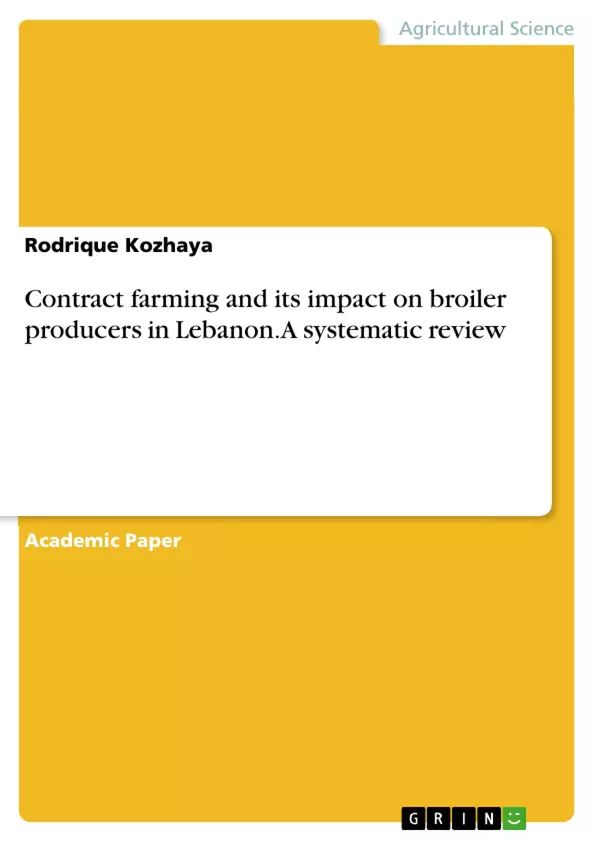The hypotheses of this thesis is: There is a positive relationship between contract farming and the economic benefits of broiler producers and the development of the broiler sector in Jezzine District. Findings from farmer’s interviews indicated that sustainability, guaranteed price, risk reduction, credit facilities and technical aids are the main reasons for signing a contract. In contrast, Farmers have expressed problems concerning the contractors’ responsibilities such as delay in payment and delivery. Also, when prices are high, it was argued that farmers were selling the products in the open market.
This thesis has been realized within the agribusiness sector and experiments the Transaction Cost Theory a branch of the New Institutional Economy which explain market failure caused by many factors. Transaction costs are associated with carrying a transaction between buyers and sellers. This study has been conducted between 2014 and 2017; and has collected data from 11 broiler producers in Jezzine, Lebanon, about: Production costs, capital investment, revenues, land tenure, access to infrastructure, and information about the contract.
Inhaltsverzeichnis (Table of Contents)
- Introduction
- Literature Review
- Theoretical Foundations
- Foundation in Transaction Cost Theory
- Factors for the emergence of contract farming
Zielsetzung und Themenschwerpunkte (Objectives and Key Themes)
This thesis examines the impact of contract farming on broiler producers in Lebanon, focusing on the Transaction Cost Theory, a branch of New Institutional Economics. The study explores the relationship between contract farming and the economic benefits of broiler producers, examining the factors contributing to the emergence and evolution of contract farming in the region.
- Economic benefits of contract farming for broiler producers
- Role of the Transaction Cost Theory in explaining market failures in the broiler industry
- Factors contributing to the emergence and evolution of contract farming
- Impact of contract farming on the development of the broiler sector
- Sustainability aspects of contract farming
Zusammenfassung der Kapitel (Chapter Summaries)
- Introduction: This chapter introduces the research context, outlining the importance of ensuring a sustainable food production system to meet the growing global demand for food. It discusses the rapid transformation changes occurring in agricultural value chains and the increasing role of vertical integration in modern agricultural systems. The chapter highlights the emergence of contract farming as an essential element of modern agricultural value chains.
- Literature Review: This chapter reviews existing literature on contract farming, focusing on incentives, risk shares, and the benefits of contracting for both farmers and processors. It examines the advantages of contract farming in addressing market imperfections and optimizing processing capacity. The chapter also explores the historical context of contract farming, highlighting its development in response to structural changes in the agricultural sector.
- Theoretical Foundations: This chapter presents the theoretical framework of the study, drawing on the Transaction Cost Theory, which explains market failures and missing markets caused by asymmetric information. It discusses the concept of transaction costs and how they relate to the economic justification for contract farming. The chapter emphasizes the importance of governance structures and contracting forms in minimizing transaction costs and ensuring efficient resource allocation.
- Factors for the emergence of contract farming: This chapter examines key factors that contribute to the emergence and evolution of contract farming. It discusses the concepts of bounded rationality, opportunistic behavior, asset specificity, uncertainty, and frequency of transactions. The chapter explores how these factors can lead to the need for contract farming as an alternative to spot market trading or full vertical integration.
Schlüsselwörter (Keywords)
The main keywords and focus topics of the text are contract farming, broiler producers, economic sustainability, transaction costs, New Institutional Economics, market failures, asset specificity, and opportunistic behavior.
Frequently Asked Questions
How does contract farming benefit broiler producers in Lebanon?
Contract farming provides producers with guaranteed prices, risk reduction, access to credit facilities, and technical assistance.
What is the Transaction Cost Theory in this context?
It is a branch of New Institutional Economics used to explain market failures and how contracts can minimize the costs associated with transactions between buyers and sellers.
What are the main problems farmers face with contractors?
Farmers often experience delays in payments and the delivery of necessary production materials by the contractors.
Why do market failures occur in the broiler industry?
Market failures are often caused by asymmetric information, opportunistic behavior, and high asset specificity involved in broiler production.
Does contract farming ensure sustainability?
Yes, findings suggest that sustainability is a primary reason for farmers to sign contracts, as it stabilizes their economic environment.
- Quote paper
- Rodrique Kozhaya (Author), 2020, Contract farming and its impact on broiler producers in Lebanon. A systematic review, Munich, GRIN Verlag, https://www.grin.com/document/538103



